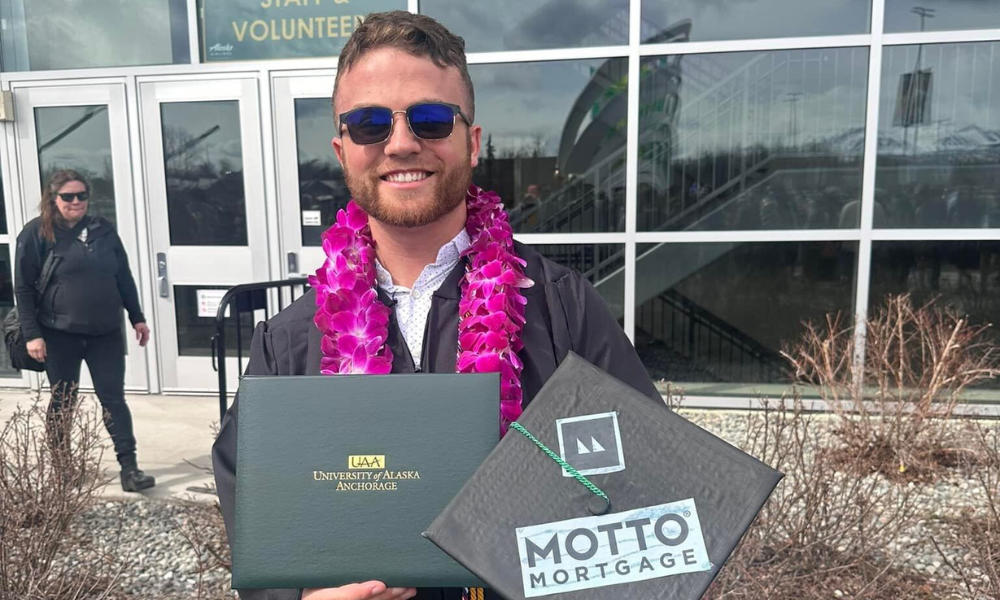Families are put into a tough spot coming into the winter, says broker-owner

For Lucas Adams (pictured), broker-owner of Motto Mortgage Aurora, the complexities of Alaska’s housing market are a constant reminder of why adaptability and innovation are crucial.
“One of the reasons we’ve been focusing on just trying to get the deal done quickly, efficiently, and for the best price for our clients is we have a lot of military families moving up here,” Adams said.
And, with limited on-base housing, these families often face the uncertainty of temporary lodging.
“Families are getting put into a tough spot coming into the winter. Can we write a three-week contract? A four-week contract? We know there’s snow on the ground, 40mph winds, and below-zero temperatures. Is the appraiser going to get out there on time?”
The urgency in meeting these needs is compounded by shifting demographics in the state. Anchorage, the largest city, is seeing a population decline, while suburbs like Wasilla and Palmer are booming.
‘Anchorage is a fast declining population base’
“We’re seeing a large shift of families moving out of the metropolitan areas into what would be the equivalent of a suburb,” Adams noted. “Anchorage is a fast declining population base. People would rather favor an hour commute to military bases versus living in the mainland city itself.”
Palmer, in particular, has become a symbol of transformation
“We have a city called Palmer that people are calling the new California,” Adams said. Its proximity to Anchorage makes it attractive for newcomers, especially those from the lower 48 states.
“People are moving up here from lower states that typically do not have the same political affiliation,” he explained, noting that while he avoids diving into politics, these shifts are reshaping the town’s character. “Palmer went from a tiny, two-street town to now being considered one of the more gentrified liberal cities in our area.”
As Alaska’s real estate market evolves, so does its economy, particularly in the energy sector.
“We’ve kind of taken a step back from the move away from fossil fuels,” Adams added.
Drilling projects, both on the North Slope and closer to suburban areas, signal a potential boom. “We’re actually exploring drilling about 30 miles from here,” he says. “It’s not just about employment; it’s about state revenue.”
Meeting the needs of military families remains a cornerstone of Motto Mortgage Aurora’s operations.
“VA loans are one of our largest products, if not the largest product, on a month-by-month basis,” Adams said. “What we’ve been pushing lately is a lot of VA renovation products. There are a lot of older homes out here that need a little love to get them up to specifications for the VA loan itself.”
In contrast, USDA loans, which might seem well-suited for Alaska’s rural character, are rarely utilized.
“I’ve actually only done one USDA loan ever,” Adams added. “The tight DTI caps, combined with a not-high-enough area median income, kind of limits our potential when it comes to USDA.”
‘We’ve been pushing e-sign pretty heavily’
Technology has become a vital tool for navigating these challenges, especially for clients relocating to Alaska. Adams highlights the growing use of e-signatures and virtual appraisals to streamline the process.
“We’ve been pushing e-sign pretty heavily,” he said, which is particularly beneficial for clients making long, arduous moves to the state. “Sometimes we’re waking up at 3:30am in the morning for a 4am signing. I tell my clients, ‘I’m going to be in my pajamas’.”
Virtual appraisal solutions have also been a game-changer, saving time and money.
“A lot of it in Alaska is chipped paint because of the winters,” Adams explained. By using technology, minor repairs can be verified with photos rather than requiring an appraiser to return to the property.
“If we can save our borrowers $200-plus three to four days in the closing process, that’s a win.”
Alaska’s unique housing dynamics extend to investment properties, where the “rent-free, live-free” model is gaining traction. “It’s great for military members because they’re putting 0% down for what is essentially a fourplex investment property,” Adams told Mortgage Professional America. Oilfield workers, who often work two weeks on and two weeks off, also benefit.
“Why pay for a mortgage by yourself if you’re only going to be there half the year?” he asked.
Short-term rentals, particularly in tourist-heavy areas like Girdwood, are another growing trend. Adams noted that financing these properties has traditionally been tricky, as underwriters struggle to quantify Airbnb income.
“We actually just discovered a program that lets us use market data from a third-party provider,” he said, making it easier to secure loans for these ventures.
Through all these shifts, Adams remains focused on adapting to Alaska’s evolving needs. “Our goal is to help families and investors navigate this unique market.”



